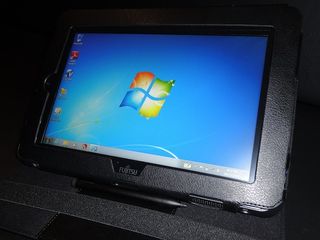Why We Can't Count Windows Out of the Tablet Game
We hear from two professionals about why they chose to go with Windows-based tablets instead of iOS or Android.
The consumer tablet market is ruled by the iPad. Apple pointed out at its iPhone 4S reveal that three out of every four tablets sold are iPads, with the rest we figure as mostly Android devices. In the consumer space, it appears to be a two-horse-race, but things aren't so clearly defined when it comes to professional applications.
We were invited to a talk hosted by Fujistu in downtown Toronto to hear from medical and education professionals about why their industries aren't able to use the same tablets that many people are buying for their couch surfing activities.

Dr. Michel Hébert, president of Quebec-based Kinlogix Medical Inc., which designs and develops healthcare solutions, spoke about why the he chose a Windows 7-based tablet, the Fujitsu Stylistic Q550, over those based on Apple or Google software.
"The consumer products, though cheaper, are not built to the security standards that the government requires," Hébert said. "There are strict criteria to ensure that the data will be kept safely."
Beyond that, Hébert said that his work demands interoperability with printing devices so that any data and information captured by the device can be easily output in paper form – something at which Windows still excels.
Like any large corporation, the systems in place for medicine must remain stable and tested. Also like corporations, governments rely on Microsoft Windows. Hébert, however, found that working with a keyboard and upright screen difficult to integrated into practicing medicine. After all, this is an industry with a deep history in papers in charts, on clipboards, noted by pens.

Microsoft's investment in touch-based input technology, as evidenced by the touch-centric advances in Windows 8, could help keep the mainstream consumer tablets from government use.
Stay on the Cutting Edge
Join the experts who read Tom's Hardware for the inside track on enthusiast PC tech news — and have for over 25 years. We'll send breaking news and in-depth reviews of CPUs, GPUs, AI, maker hardware and more straight to your inbox.
While Apple's inroads in the educational realm are quite plain to see (just take a look at campuses these days to see how many Macs and iOS devices are floating around), when it comes down to serious school work, Windows may still have the upper hand.

Steve Rush, director of IT and head of Computer Science at St. Andrews College in Ontario, explained how having both a keyboard and touchscreen are critical to how his colleagues educate. Having is keyboard is important for entering text, while a touchscreen is perfect for scribbling drawings. For this reason, his choice of device for students is a Windows 7-based convertible laptop. His students use Sandy Bridge-based laptops that can also double as gaming machines for "out of school" activities, thanks to discrete Nvidia graphics.
Further cementing the need for a Windows-based PC machine is the implementation and reliance on Microsoft OneNote for all student activities. Students are able to collect outside data from various sources, including sound and video, while also adding in their notes. Rush even demonstrated textbooks integrated into OneNote. While OneNote is available as part of the Microsoft Office suite for Windows, it's not a part of even Office 2011 for Mac. Strangely, there's a free Microsoft OneNote app for the iPhone.
Though the talks given by both the physician and educator were at a Fujitsu-organized event, the main takeaway was that Windows still has a very strong hold on the tablet and touch market – stronger than some may believe in light of the strong sales of iPads and Android tablets. Perhaps it is for this reason that Microsoft is making Windows 8 for ARM-based devices – because it knows that the touch-screen computing war has just begun.
In fact, Dell and HP, both major players in the computer industry, have tried and failed at the tablet market so far with Streak and TouchPad products, respectively. They aren't giving up, however, as both reportedly plan to use the release of Windows 8 as a 'second coming event'.
Related news:
-
amk-aka-Phantom ReplyWhy We Can't Count Windows Out of the Tablet Game
Ummm... who said we could??? -
soo-nah-mee amk-aka-phantomUmmm... who said we could???Exactly.Reply
Windows 8 is shaping up to be a killer tablet OS; probably more so than a PC OS.
Having used WP7 for a couple of months now, I can say that a similar OS on a tablet would be a great user experience.
-
JamesSneed Well written article but strangely felt like a Microsoft marketing pitch. A reason we cant count windows out is that students cant use Microsoft's One Note on a Mac, seriously lost me on that. There is not a single reasonable reason why Windows is better in this article. I personally don't use Macs and think MS will be a huge player in tablets but I just found this article sounding like a Windows 8 sales pitch.Reply -
hoof_hearted I am hoping that this brings gaming to the next level on tablets. With directx, there is lots of dev experience out there. iPhone and Android are still rinky-dink in this area.Reply -
amk-aka-Phantom Reply9319418 said:I am hoping that this brings gaming to the next level on tablets. With directx, there is lots of dev experience out there. iPhone and Android are still rinky-dink in this area.
UGH! Get out of here! Tablet gaming is worse than consoles... -
No on can beat the Windows market share of 80%. Switching to other OS is not cost effective in business. A lot of things are still tied up with windows. No one can argue with that.Reply
-
jhansonxi Obviously it's just an advertisement. Some more info about Steve Rush, St. Andrews College, and their $2000 tablets here.Reply -
clonazepam Not hard to figure... its been said for awhile iOS and Android are fun to play with, but when there's real work to be done, its time to whip out Windows (hierarchy follows then Linux then OSX, personal opinions force me to list OSX last). :DReply
Most Popular







